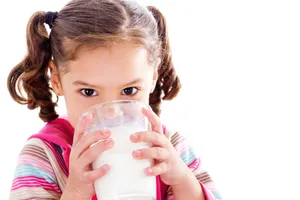Researchers from St. Michael’s Hospital in Toronto are claiming that too much cow’s milk for little kids can be just as bad as not enough. And findings from the new study challenge our current recommendations on daily milk consumption for children.
The study monitored a group of 1,311 healthy children between the ages of 2 and 5-years old, examining blood samples for vitamin D and iron stores and gathering information from parents about the amount of milk consumed by their children.
“I don’t want to underestimate the importance of cow’s milk for children,” says Dr. Jonathon Maguire Maguire, study lead and pediatrician at St. Michael’s Hospital. “[However]…iron deficiency severe enough to cause anemia [leads to] difficulties with cognitive development over time.”
Unfortunately, this means that milk consumption by preschoolers is a balancing act for healthy vitamin D and iron levels. The middle ground seems to exist at around 500 milliliters of milk per day. This amount is enough to give children adequate levels of vitamin D and iron, with the addition of a vitamin D supplement during winter months for darker skinned children who need maintaining healthy iron levels.
Source: Globe & Mail



